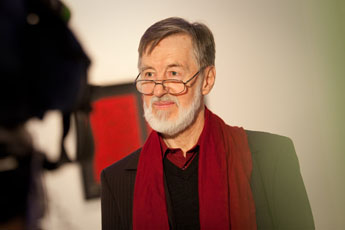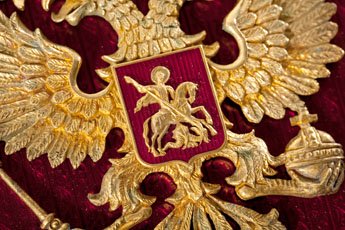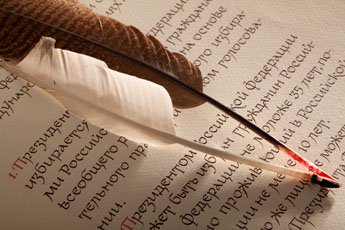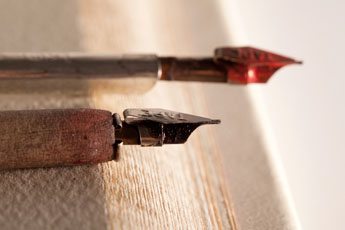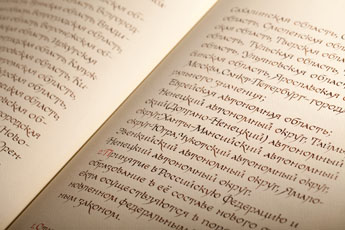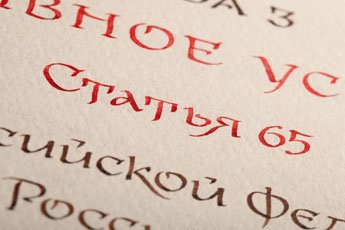5-month long calligraphy marathon, or an attempt to write the Constitution of the Russian Federation
It's been almost 10 years since the unique Handwritten Constitution of the Russian Federation has been created. Petr Chobitko, its author, Chairman of the Presidium of the National Union of Calligraphers and member of the Union of Artists of Russia, shares the impressions he had over the course of making this magnificent calligraphy piece.
Just like mountain climbing, calligraphy has its own peaks and stages. With all my calligraphy practice of many years, one of the significant peaks for me was writing the Constitution of the Russian Federation. Creating literary texts, especially when they resonate with your heart and come in harmony with the state of mind, resembles a pleasant promenade in the hills on a sunny day. However, writing such a sensitive text as the Constitution is, which demands to encapsulate a lot including the national spirit, is an overwhelming challenge, and even more so when you work against the clock. So when Alexey Shaburov for the first time offered me to produce this calligraphy text for the first international exhibition, I hesitated and found many reasons to say a nice “no”. First, one had to develop an appropriate script, create a design concept for the page and the cover, write the text, back and bind it. In my mind I was quick to imagine the map of prospective issues and challenges. Yet Alexey's sound arguments about the importance of this job, as one of the key and crucial parts of the entire project, crossed the t's and dotted the i's… With a heavy sigh I agreed, putting my trust in supreme forces only. I had a hunch that a great deal of both objective and subjective obstacles and hindrances lie ahead. That was exactly the case. I barely had a chance to produce the script sample at the very first stage when came down with pneumonia and ended up in a hospital. Yet continuous care and support on the part of Alexey helped me come through shortly. To ensure I recover quickly enough, he found an opportunity for me to go to a health retreat in Crimea, where it took me to put up with ambient air at 40 degrees Celsius, yet I did well to combine the treatment course and the writing process.
The said process uncovered one more challenge I never experienced before. The need to write daily, painstakingly making sure all the nuances, such as pen angle, rhythm or ideal spacing between letters and words, were there, turned the whole project into some kind of a marathon lasting for many days. Five months, if I am precise. Weather changes, magnetic disturbances, heat, cold or humid waves – all of the above would take its toll of my physical and emotional state, with a certain impact on such a delicate process as writing. Initially I had to keep myself in check to maintain a particular psychological tension. This was the way to make sure the letters are clear, writing rhythm matches reading pace, sweaty hand does not disturb the paper after many hours of intense writing, and most importantly, no mistakes are made. Let alone hyphenations or another couple of letters attempting to jump out from the text box to the margins!
I developed brain cramps after many hours of work, just like drivers have – sometimes I would find myself writing with no clear idea or understanding what exactly I am writing. Such instances would make me rewrite the whole pages. Inner agitation started to grow together with a feeling of anxiety. I needed a way to remain calm over ten or twelve hours of near continuous writing with no canons upset. And the next moment I recalled the advice from Old Believers, who used to work on manuscripts: “keep on praying to make sure you don’t wander off your path”. It gave me strength and assured I will be able to finish the started.
The aid arrived from my students, who took up some of the routines, such as drawing of lines or text markup. For them it proved a good practice and training to perform lasting and monotonous tasks. A few years later Denis Lotarev joined Redkaya Kniga publishing house as an in-house calligraphy artist, and Olga Varlamova embarked upon the journey of creating manuscripts and teaching the same course in the Centre of Calligraphy Art. I often reflect on this special period in my calligraphy practice, which taught me a very valuable lesson – to reach out to the supreme forces during crucial moments in my personal and professional life.
I deeply appreciate Alexey for being able to engage me into this challenging project, which expanded my creative capacity and granted an invaluable intrinsic experience. I am grateful to my students who sacrificed their summer holidays and were zealous on this difficult work. Also I could hardly cope with all the challenges if not for my wife Victoria’s unfailing help and support. I think the idea of creating the handwritten Constitution emerged in the very moment when the national consciousness woke up together with the understanding how great and worthy of respect Russia is in every aspect, including its principal document, the Constitution. The fact that this project had come to life testifies how significant and well-timed it was.
The process and its tight schedule required strict and clear management provided by Alexey Shaburov, who was able to unite all the stakeholders – designers, bookbinders, proofreaders and jewellers.
The handwritten Constitution of the Russian Federation was not only written in time by the Contemporary Museum of Calligraphy opening date, but was also published as a limited edition of mini facsimile copies.
Man′s beauty is in the beauty of his writing.
